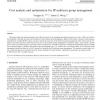Free Online Productivity Tools
i2Speak
i2Symbol
i2OCR
iTex2Img
iWeb2Print
iWeb2Shot
i2Type
iPdf2Split
iPdf2Merge
i2Bopomofo
i2Arabic
i2Style
i2Image
i2PDF
iLatex2Rtf
Sci2ools
126
click to vote
COMCOM
2007
2007
Cost analysis and optimization for IP multicast group management
This paper studies the system parameters that affect the total cost of managing the multicast group on a router. A Petri net model is first proposed to describe the states and transitions of the multicast group management. Based on this model, a delayed vacation queue, extended from a simple M/M/1 queue, is used to analyze the total cost of the multicast group management under various system conditions. The formal analysis reveals that the total cost of the multicast group management is minimized when a router delays a certain time to send its pruning messages to upstream routers. Furthermore, a formula is derived to calculate the optimal delay time for sending the pruning messages to minimize the multicast group management cost. To validate this cost analysis model, an IP multicast group management module is added to the NS-2 simulator to simulate the IP multicast group management. The simulation results under various system parameters are consistent with the results obtained by fo...
Related Content
| Added | 12 Dec 2010 |
| Updated | 12 Dec 2010 |
| Type | Journal |
| Year | 2007 |
| Where | COMCOM |
| Authors | Yongjun Li, James Zijun Wang |
Comments (0)

